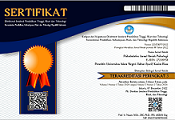Pengembangan Konseling Spiritual Pada Masa Rehabilitasi Untuk Pecandu Narkoba
Abstract
Kecanduan narkoba dapat mengganggu kehidupan keluarga, masyarakat, dan proses sekolah, menghadirkan ancaman langsung atau tidak langsung bagi pembangunan masa depan bangsa dan negara. Tujuan penelitian ini mendeskripsikan konseling spiritual bagi pecandu narkoba. Penelitian bersifat kualitatif dengan tahapan: Menentukan pertanyaan, mengumpulkan data-data informan, mendapatkan data, dan laporan. Adapun informan terdiri dari tiga pasien pecandu narkoba. Hasil penelitian berdasarkan koding Nvivokonseling spiritual terdapa tiga sub tema yaitu belajar agama, belajar sholat, dan belajar baca al-Qur’an. Kemudian tema dampak program religi memecah menjadi empat sub tema yaitu dekat degan Allah, memotivasi diri, konsisten tetap beribadah dan rajin sholet. Seluruhnya merupakan kata yang sering dibicarakan oleh narasumber. Konseling spiritual ini masih belum maksimal dalam pelaksanaanya sebab knselor bekerja sama dengan instruktur religi bukan konselor profsional dibidangnya dan pada Napza program ini hanya sebatas kegiatan religi pada uumnya.
Full Text:
PDFReferences
Amirafzali, Zahra, and Mahmoud Shirazi. 2016. “On the Predictive Role of Spiritual Health and Self-Efficacy in Addiction Potential among Addicts and Non-Addicts in Jiroft.” Scientific Quarterly Research on Addiction 10(39):79–93.
Arani, Zahra Aliakbarzadeh, Azam Biderafsh, and Somaie Salmani. 2019. “The Relationship of Spirituality Development and Addiction Potential among Students of Qom University of Medical Sciences.” Journal of Religion and Health 58(4):1107–14.
DiReda, J., and J. Gonsalvez. 2016. “The Role of Spirituality in Treating Substance Use Disorders.” Journal of Psychology and Clinical Psychiatry 6(4):365.
Edlund, Mark J., Katherine M. Harris, Harold G. Koenig, Xiaotong Han, Greer Sullivan, Rhonda Mattox, and Lingqi Tang. 2010. “Religiosity and Decreased Risk of Substance Use Disorders: Is the Effect Mediated by Social Support or Mental Health Status?” Social Psychiatry and Psychiatric Epidemiology 45(8):827–36.
George, Linda K., Christopher G. Ellison, and David B. Larson. 2002. “Explaining the Relationships between Religious Involvement and Health.” Psychological Inquiry 13(3):190–200.
Gomes, Fernanda Carolina, Arthur Guerra de Andrade, Rafael Izbicki, Alexander Moreira Almeida, and Lúcio Garcia de Oliveira. 2013. “Religion as a Protective Factor against Drug Use among Brazilian University Students: A National Survey.” Revista Brasileira de Psiquiatria 35(1):29–37.
Gonçalves, Juliane P. B., Giancarlo Lucchetti, Paulo Rossi Menezes, and Homero Vallada. 2015. “Religious and Spiritual Interventions in Mental Health Care: A Systematic Review and Meta-Analysis of Randomized Controlled Clinical Trials.” Psychological Medicine 45(14):2937–49.
Jim, Heather S. L., James E. Pustejovsky, Crystal L. Park, Suzanne C. Danhauer, Allen C. Sherman, George Fitchett, Thomas V Merluzzi, Alexis R. Munoz, Login George, and Mallory A. Snyder. 2015. “Religion, Spirituality, and Physical Health in Cancer Patients: A Meta‐analysis.” Cancer 121(21):3760–68.
Van der Meer Sanchez, Zila, Lucio Garcia De Oliveira, and Solange Aparecida Nappo. 2008. “Religiosity as a Protective Factor against the Use of Drugs.” Substance Use & Misuse 43(10):1476–86.
Miller, William R., and Carl E. Thoresen. 2003. “Spirituality, Religion, and Health: An Emerging Research Field.” American Psychologist 58(1):24.
Moreira-Almeida, Alexander, Harold G. Koenig, and Giancarlo Lucchetti. 2014. “Clinical Implications of Spirituality to Mental Health: Review of Evidence and Practical Guidelines.” Brazilian Journal of Psychiatry 36:176–82.
Moreira-Almeida, Alexander, Francisco Lotufo Neto, and Harold G. Koenig. 2006. “Religiousness and Mental Health: A Review.” Brazilian Journal of Psychiatry 28:242–50.
Naghibi, Seyed Abolhassan, Soror Ashari, Fereshteh Rostami, and Seyed Hamze Hosseini. 2015. “Evaluation of the Relationship between Spiritual Health and Mental Health in Patients Undergoing Methadone Maintenance Treatment.” Journal of Health Research in Community 1(3):61–69.
Peterman, Amy H., George Fitchett, Marianne J. Brady, Lesbia Hernandez, and David Cella. 2002. “Measuring Spiritual Well-Being in People with Cancer: The Functional Assessment of Chronic Illness Therapy—Spiritual Well-Being Scale (FACIT-Sp).” Annals of Behavioral Medicine 24(1):49–58.
Puchalski, Christina M., Benjamin Blatt, Mikhail Kogan, and Amy Butler. 2014. “Spirituality and Health: The Development of a Field.” Academic Medicine 89(1):10–16.
Rahimian Boogar, Eshagh, Kaveh Alavi, and Maryam Esfahani. 2014. “The Psychological, Demographical and Socio-Economic Factors Related with Suicidal Ideation among General Population of Semnan City in 1391.” Journal of Arak University of Medical Sciences 17(1):0.
Richards, P. Scott, Randy K. Hardman, and Michael E. Berrett. 2007. Spiritual Approaches in the Treatment of Women with Eating Disorders. American Psychological Association.
Tajiri, Hajir. 2018. “Pendekatan Konseling Spiritual Dalam Penyembuhan Pasien Narkoba Di Inabah VII Tasikmalaya.” Anida (Aktualisasi Nuansa Ilmu Dakwah) 18(1):21–40.
Terry-McElrath, Yvonne M., Sherry Emery, Glen Szczypka, and Lloyd D. Johnston. 2011. “Potential Exposure to Anti-Drug Advertising and Drug-Related Attitudes, Beliefs, and Behaviors among United States Youth, 1995–2006.” Addictive Behaviors 36(1–2):116–24.
Amirafzali, Zahra, and Mahmoud Shirazi. 2016. “On the Predictive Role of Spiritual Health and Self-Efficacy in Addiction Potential among Addicts and Non-Addicts in Jiroft.” Scientific Quarterly Research on Addiction 10(39):79–93.
Arani, Zahra Aliakbarzadeh, Azam Biderafsh, and Somaie Salmani. 2019. “The Relationship of Spirituality Development and Addiction Potential among Students of Qom University of Medical Sciences.” Journal of Religion and Health 58(4):1107–14.
DiReda, J., and J. Gonsalvez. 2016. “The Role of Spirituality in Treating Substance Use Disorders.” Journal of Psychology and Clinical Psychiatry 6(4):365.
Edlund, Mark J., Katherine M. Harris, Harold G. Koenig, Xiaotong Han, Greer Sullivan, Rhonda Mattox, and Lingqi Tang. 2010. “Religiosity and Decreased Risk of Substance Use Disorders: Is the Effect Mediated by Social Support or Mental Health Status?” Social Psychiatry and Psychiatric Epidemiology 45(8):827–36.
George, Linda K., Christopher G. Ellison, and David B. Larson. 2002. “Explaining the Relationships between Religious Involvement and Health.” Psychological Inquiry 13(3):190–200.
Gomes, Fernanda Carolina, Arthur Guerra de Andrade, Rafael Izbicki, Alexander Moreira Almeida, and Lúcio Garcia de Oliveira. 2013. “Religion as a Protective Factor against Drug Use among Brazilian University Students: A National Survey.” Revista Brasileira de Psiquiatria 35(1):29–37.
Gonçalves, Juliane P. B., Giancarlo Lucchetti, Paulo Rossi Menezes, and Homero Vallada. 2015. “Religious and Spiritual Interventions in Mental Health Care: A Systematic Review and Meta-Analysis of Randomized Controlled Clinical Trials.” Psychological Medicine 45(14):2937–49.
Jim, Heather S. L., James E. Pustejovsky, Crystal L. Park, Suzanne C. Danhauer, Allen C. Sherman, George Fitchett, Thomas V Merluzzi, Alexis R. Munoz, Login George, and Mallory A. Snyder. 2015. “Religion, Spirituality, and Physical Health in Cancer Patients: A Meta‐analysis.” Cancer 121(21):3760–68.
Van der Meer Sanchez, Zila, Lucio Garcia De Oliveira, and Solange Aparecida Nappo. 2008. “Religiosity as a Protective Factor against the Use of Drugs.” Substance Use & Misuse 43(10):1476–86.
Miller, William R., and Carl E. Thoresen. 2003. “Spirituality, Religion, and Health: An Emerging Research Field.” American Psychologist 58(1):24.
Moreira-Almeida, Alexander, Harold G. Koenig, and Giancarlo Lucchetti. 2014. “Clinical Implications of Spirituality to Mental Health: Review of Evidence and Practical Guidelines.” Brazilian Journal of Psychiatry 36:176–82.
Moreira-Almeida, Alexander, Francisco Lotufo Neto, and Harold G. Koenig. 2006. “Religiousness and Mental Health: A Review.” Brazilian Journal of Psychiatry 28:242–50.
Naghibi, Seyed Abolhassan, Soror Ashari, Fereshteh Rostami, and Seyed Hamze Hosseini. 2015. “Evaluation of the Relationship between Spiritual Health and Mental Health in Patients Undergoing Methadone Maintenance Treatment.” Journal of Health Research in Community 1(3):61–69.
Peterman, Amy H., George Fitchett, Marianne J. Brady, Lesbia Hernandez, and David Cella. 2002. “Measuring Spiritual Well-Being in People with Cancer: The Functional Assessment of Chronic Illness Therapy—Spiritual Well-Being Scale (FACIT-Sp).” Annals of Behavioral Medicine 24(1):49–58.
Puchalski, Christina M., Benjamin Blatt, Mikhail Kogan, and Amy Butler. 2014. “Spirituality and Health: The Development of a Field.” Academic Medicine 89(1):10–16.
Rahimian Boogar, Eshagh, Kaveh Alavi, and Maryam Esfahani. 2014. “The Psychological, Demographical and Socio-Economic Factors Related with Suicidal Ideation among General Population of Semnan City in 1391.” Journal of Arak University of Medical Sciences 17(1):0.
Richards, P. Scott, Randy K. Hardman, and Michael E. Berrett. 2007. Spiritual Approaches in the Treatment of Women with Eating Disorders. American Psychological Association.
Tajiri, Hajir. 2018. “Pendekatan Konseling Spiritual Dalam Penyembuhan Pasien Narkoba Di Inabah VII Tasikmalaya.” Anida (Aktualisasi Nuansa Ilmu Dakwah) 18(1):21–40.
Terry-McElrath, Yvonne M., Sherry Emery, Glen Szczypka, and Lloyd D. Johnston. 2011. “Potential Exposure to Anti-Drug Advertising and Drug-Related Attitudes, Beliefs, and Behaviors among United States Youth, 1995–2006.” Addictive Behaviors 36(1–2):116–24.
DOI: http://dx.doi.org/10.24014/pib.v2i3.15302
Refbacks
- There are currently no refbacks.
Redaksi Psikobuletin: Buletin Ilmiah Psikologi
Publisher: Universitas Islam Negeri Sultan Syarif Kasim Riau
Jl. H.R. Soebrantas Km. 15.5 No. 155 Gedung Fakultas Psikologi UIN Sultan Syarif Kasim Riau Kel. Tuahmadani Kec. Tampan Pekanbaru - Riau 28293.
E-mail : psikobuletin@uin-suska.ac.id / Website :http://ejournal.uin-suska.ac.id/index.php/Psikobuletin
Psikobuletin : Buletin Ilmiah Psikologi by Fakultas Psikologi is licensed under a Creative Commons Attribution 4.0 International License.



31.png)





